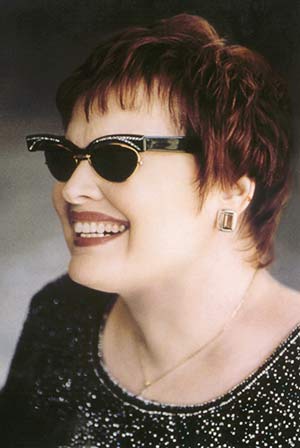|
Not everyone is prepared to forgive Schuur's dipping into Pop music, though she always returns to the Blues and Jazz that have sustained her. A tune like "Louisiana Sunday Afternoon" with its simple back beat and repeated refrains next to the subtle and haunting Jazz standard, "Poinciana" can be an uneasy pairing for purists.
Of course, such concerns would not be shared by Diane's many fans who are perfectly happy to make this journey back and forth without fussing over which is the preferred or more sophisticated form. It is this capacity to enjoy well-written material from any source that allows Schuur to relate to and successfully reinterpret the great songs created by James Taylor — we heard his "Don't Let Me Be Lonely Tonight" — or Stevie Wonder's "As". Similarly, Schuur's joining with the musically typecast Barry Manilow to create an entire album of originals might strike some Jazz singers as a little risky. No question that Schuur has learned to trust her own taste as to the worthiness of songs. Perhaps she knows best the origins of many of today's Jazz standards and is having fun with such explorations. After all, the Tin Pan Alley origins of the great "The Man I Love" from the Gershwins, or the Hollywood musical origins of "(somewhere) Over the Rainbow" haven't detracted from their classic status and capacity to be made fresh again with judicious phrasing and re-harmonizations such as Diane applies.
And how can we take issue with Schuur's romantic and touching delivery of such great songs as "You'd Be So Nice to Come Home To", "The Very Thought of You" or "You Would Be So Easy To Love"? One would be tempted to say she has a Schuur touch if we didn't know that people already take issue with the overuse of such puns.
In Schuur's mention of colleagues and mentors Ray Charles and Stevie Wonder, we have the prologue to the topic of her blindness. Via Diane’s private monitor “ears”, the ever-attendant Hines names the upcoming tunes and we realize that leading the band while holding the audience captive might take a lot more determination and focus than might otherwise be required. However, the artifice and the extra effort are not apparent. Nothing is allowed to take us away from the enjoyment of the moment. The music is spirited and the patter comfortable, if sometimes giggled. We, the audience, are totally taken in with the delivery. This is entertainment done well and convincingly.
In the end, each successful performer learns to reveal something of who they are to the audience. We gain clues with each tune and introduction. "I'll Close My Eyes" may have been recorded by Sarah Vaughan, Dinah Washington and dozens of others, but Schuur makes special the meaning of the lyrics "I'll close my eyes and I'll see you with my heart" as addressed to a lost sister.
With the final and evidently carefully chosen "Life is Good" by Manilow as her second encore, we are provided a final clue to Diane Schuur. She may have rescued herself from earlier demons and have the right to sing the blues, but she is on track to an ever better life.
|



